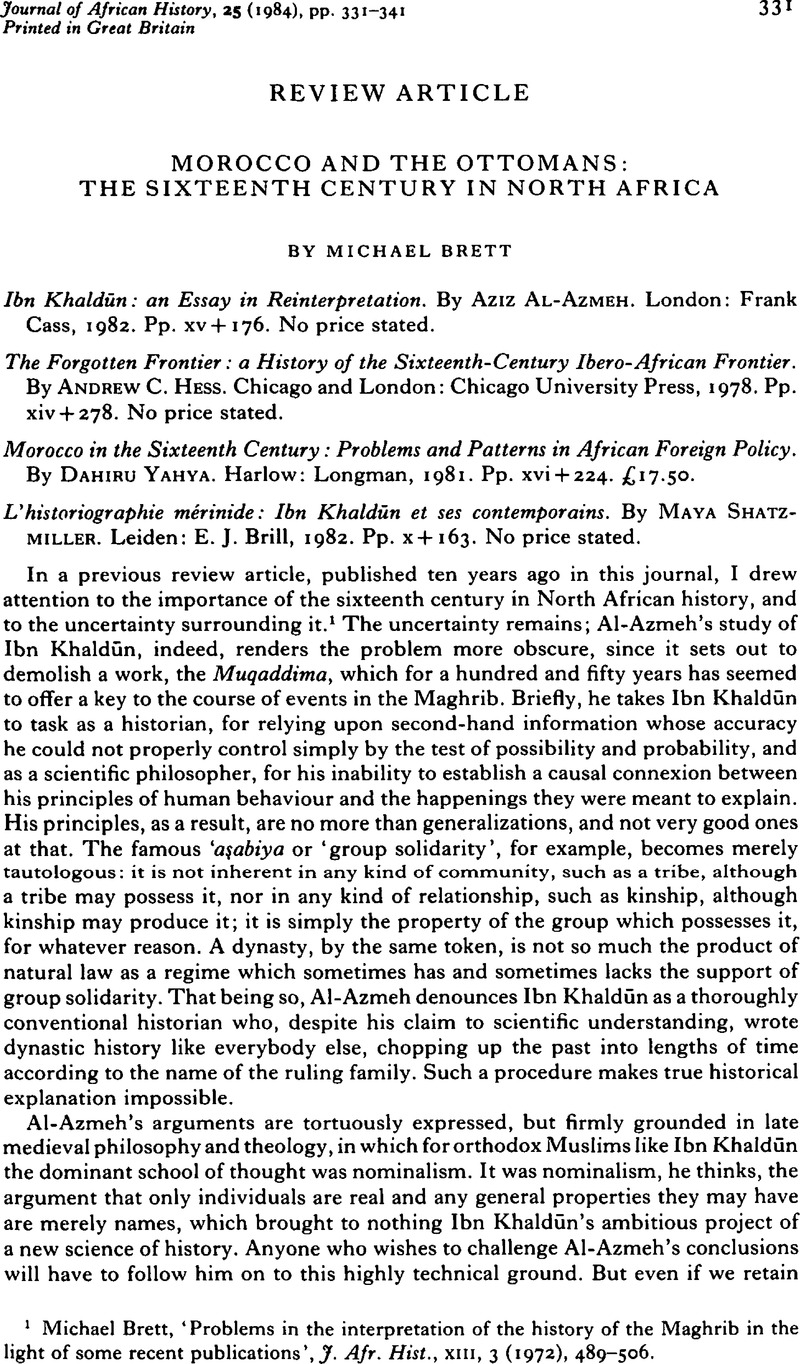Article contents
Morocco and the Ottomans: the Sixteenth Century in North Africa
Published online by Cambridge University Press: 22 January 2009
Abstract

- Type
- Review Article
- Information
- Copyright
- Copyright © Cambridge University Press 1984
References
1 Brett, Michael, ‘Problems in the interpretation of the history of the Maghrib in the light of some recent publications’, J. Afr. Hist., XIII, 3 (1972), 489–506.CrossRefGoogle Scholar
2 Braudel, Fernand, The Mediterranean and the Mediterranean World in the Age of Philip II, Eng. trans. of 2nd revised ed., 2 vols. (London and New York, 1972)Google Scholar; cf. briefly preface to the first edition, and conclusion.
3 Cf. e.g. Brett, Michael and Forman, Werner, The Moors: Islam in the West (London, 1980), 91–120.Google Scholar
4 Braudel, , The Mediterranean, 776–801.Google Scholar
5 Ibid., 87–91.
6 Ibid., 95–99.
7 Ibid., 22.
8 Gautier, E.-F., Le passé de l'Afrique du Nord: les siècles obscurs, 2nd ed. (Paris, 1952).Google Scholar
9 Ibid., 243–4.
10 Braudel, , The Mediterranean, 771–773.Google Scholar
11 Ibid., 799–800.
12 Cf. e.g. Brett, , ‘Problems’, 490–491.Google Scholar
13 Cf. e.g. Julien, Ch.-A., History of North Africa from the Arab Conquest to 1830 (London, 1970), 343.Google Scholar
14 Cf. Terrasse, H., Histoire du Maroc, 2 vols. (Casablanca, 1950), 11, 132.Google Scholar
15 Abun-Nasr, J., A History of the Maghrib, 2nd ed. (Cambridge, 1975), 202–203, 12.Google Scholar
16 Cf. García-Arenal, M., ‘The revolution of Fās in 869/1465 and the death of Sultan ‘Abd al-Ḥaqq al-Marīnī’, Bulletin of S.O.A.S., XLI, i (1978), 43–66.Google Scholar
17 Geertz, Clifford, Islam Observed: religious development in Morocco and Indonesia (Chicago and London, 1968).Google Scholar
18 Berque, Jacques, L'intérieur du Maghreb, XVe-XIXe siècles (Paris, 1978), chap, xGoogle Scholar; cf. Brett, Michael, ‘Jacques Berque and the history of the Maghreb’, The Maghreb Review, IV, 4–6 (1979), 140–48.Google Scholar
19 Cf. Cigar, Norman, Muhammad al-Qadiri's Nashr al-mathani: The Chronicles (Oxford, 1981), xxix–xxxi.Google Scholar
20 Hess, , The Forgotten Frontier, 179.Google Scholar
21 Yahya, , Morocco, 27.Google Scholar
22 Ibid., 151–2.
23 De Torres, Diego, Relation del origen y suceso de los xarifes y del estado de los reinos de Marruecos, Fezy Tarudante, ed. Mercedes, García-Arenal (Madrid, 1980)Google Scholar; cf. García-Arenal, M., ‘Spanish literature on North Africa in the XVI Century: Diego de Torres’, The Maghreb Review, VIII, 1–2 (1983), 53–9.Google Scholar
24 Marzūq, Ibn, Al-Musnad as-sahih al-hasan fi ma'athir Mawlana Abi al-Hasan, ed. Viguera, Maria J. (Algiers, 1981)Google Scholar; Spanish trans., idem, El Musnad: hechos memorables de Abū l-Ḥasan, Sultan de los Benimerines (Madrid, 1977).Google Scholar
25 Ibid., chaps, XXIII, XXXIV-XXXVI: text, 281–9, 359–382; trans. 232–240, 296–315.
26 Khaldūn, Ibn, The Muqaddimah: an introduction to history, trans. Rosenthal, F., 2nd ed. (Princeton, N.J., 1967)Google Scholar, chap. 3.
27 For this officer, cf. Hopkins, J. F. P., Medieval Muslim Government in Barbary (London, 1958), 50–51Google Scholar; Brunschvig, R., La Berbérie orientate sous les Hafsides, 2 vols. (Paris, 1940, 1947), 11, 53, 56–59.Google Scholar
28 Brett, , The Moors, 39.Google Scholar
29 Mercer, Patricia, ‘Palace and Jihād in the early ‘Alawī state in Morocco’, J. Afr. Hist., XVIII, iv (1977), 531–553.CrossRefGoogle Scholar
30 Torres, , Relation, 235Google Scholar: the Factores or tax-collectors appear to belong to the same body as the Iuezes Comissarios or judges charged ‘to go above the Arabs and the Berbers administering justice according to the diversity of their rites (sc. madhhab-s, law schools) and customs’.
31 Yahya, , Morocco, 111.Google Scholar
32 For the information in this paragraph, cf. Torres, , Relation, 235–237Google Scholar, and Harakat, B., ‘Le Makhzen Saadien’, Revue de l'Occident Musulman et de la Méditerranée, 15–16 (1973), 43–59.CrossRefGoogle Scholar
33 Cf. Abun-Nasr, , History of the Maghrib, 216–226.Google Scholar
34 Hess, , The Forgotten Frontier, 186.Google Scholar
35 Ibid., 156–78; Julien, , History of North Africa, 284–288, 302–303, 321–324Google Scholar; Spencer, William, Algiers in the Age of Corsairs (Norman, Oklahoma, 1976), 40–65.Google Scholar
- 4
- Cited by


